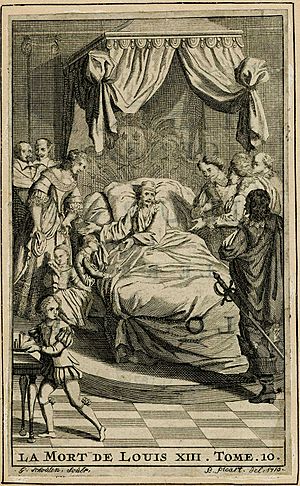Michel Le Vassor facts for kids
Michel le Vassor (born around 1648, died 1718) was a French priest and writer. He was part of a group called the Oratorians. Later, he became a Protestant when he moved to England. He is known for his books about religion, history, and politics.
Contents
Michel le Vassor's Life Journey
Michel le Vassor was born in Orléans, France, around 1648. He was influenced by the ideas of Nicolas Malebranche, another thinker. Le Vassor also had views similar to a group called the Jansenists. In 1679, he tried to bring Malebranche and another scholar, Antoine Arnauld, to an agreement, but it didn't work. Le Vassor's talks about grace (a religious idea) caused a big public discussion.
In 1690, Le Vassor left the Oratorians. Five years later, in 1695, he became a Protestant. He then traveled through the Netherlands to England. In England, important people like William Bentinck, 1st Earl of Portland and Gilbert Burnet supported him. He passed away in Northamptonshire, England.
In 1702, he became a Fellow of the Royal Society. This is a special group for important scientists and thinkers.
Michel le Vassor's Writings
Michel le Vassor wrote many important books. These books covered different topics, from religion to history.
Religious and Philosophical Works
Le Vassor's book Traité de la véritable religion (published in 1688) was a strong response. It challenged the ideas of Richard Simon, Jean Le Clerc, and Benedict Spinoza. Spinoza's ideas were quite new and sometimes controversial. Le Vassor's book helped make his name famous. Many people recommended it.
At that time, a form of Spinoza's ideas was becoming popular in France. Le Vassor argued that the main religious challenge was now against general disbelief. He felt that Christianity needed to be "enlightened" to fight against these new ideas. He believed in showing how nature was designed in a smart way. He also thought that people naturally believed in a God who cared for them. And he emphasized the importance of old traditions from the Church.
Richard Simon wrote a defense against Le Vassor in 1689. It was published under the name of a nephew. In the same year, Le Vassor also published some simpler versions of parts of the New Testament.
Another book, Traité de la manière d'examiner les différends de religion (1697), was seen as a defense of the Church of England. He also translated letters from the 16th century. These were called Lettres et memoires de François de Vargas, de Pierre de Malvenda et de quelques évéques d'Espagne touchant le Concile de Trent (1699). They were about the Council of Trent, an important meeting in Church history.
Political and Historical Books
An anonymous book called Les Soupirs de la France esclave (1689) is often thought to be written by Le Vassor. This book talked about economic issues in France under the old system of government. It was published in 15 parts. Much of it was reprinted later in 1788. Le Vassor's Lettres d'un gentilhomme français (1695) discussed a suggested new tax in France.
Le Vassor also wrote a long history book called Histoire du règne de Louis XIII. This book was published in Amsterdam starting in 1700 and had ten volumes. It was very critical of the Catholic Church. When this book came out, Le Vassor was teaching Henry Bentinck, a young nobleman. Louis XIV, the King of France, even asked Henry's father to fire Le Vassor because of the book. The father eventually agreed to avoid problems with the king. The famous writer Voltaire said Le Vassor's history was very critical. Voltaire noted that while the facts were mostly correct, all the judgments were negative.
Another work by Le Vassor was An account of the present state and government of the Empire of Germany (1711). This book was written for Thomas Foley after the death of Joseph I, Holy Roman Emperor.
 | James Van Der Zee |
 | Alma Thomas |
 | Ellis Wilson |
 | Margaret Taylor-Burroughs |


